By Beau Mullen · Tuesday, September 10, 2013 As an occasional feature on TELOSscope, we highlight a past Telos article whose critical insights continue to illuminate our thinking and challenge our assumptions. Today, Beau Mullen looks at Alain de Benoist’s “The Idea of Empire,” from Telos 98–99 (Winter 1993/Spring 1994).
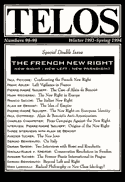 Few political concepts have appeared as destined to be cast into history’s dustbin as that of empire. The nation-state is the most widely accepted model for sovereign territories, and imperial ambitions of nations are often condemned by the international community. The existence of great empires, such as that of the Romans or of the Holy Roman Empire, it appears, are simply regimes that are relics of a distant, less enlightened historical era. The areas once encompassing the great empires have now fractured into sovereign nation-states, each with its own polity and allegiances. Furthermore, serious modern confederation between nations is most often based on monetary concerns, not the furtherance of any imperial goal or ambition. The sun, it could be said, has set on the idea of empire. Few political concepts have appeared as destined to be cast into history’s dustbin as that of empire. The nation-state is the most widely accepted model for sovereign territories, and imperial ambitions of nations are often condemned by the international community. The existence of great empires, such as that of the Romans or of the Holy Roman Empire, it appears, are simply regimes that are relics of a distant, less enlightened historical era. The areas once encompassing the great empires have now fractured into sovereign nation-states, each with its own polity and allegiances. Furthermore, serious modern confederation between nations is most often based on monetary concerns, not the furtherance of any imperial goal or ambition. The sun, it could be said, has set on the idea of empire.
Continue reading →
By Johannes Grow · Tuesday, August 27, 2013 As an occasional feature on TELOSscope, we highlight a past Telos article whose critical insights continue to illuminate our thinking and challenge our assumptions. Today, Johannes Grow looks at Pierluigi Mennitti’s “Germany in Decline,” from Telos 127 (Spring 2004).
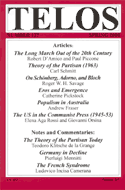 In “Germany in Decline,” from Telos 127 (Spring 2004), Pierluigi Mennitti addresses Berlin’s inability to enact “true” reforms, which has subsequently led to a decline in its economic, geopolitical, and cultural influence. Through an examination of a contemporaneous Der Spiegel article, Mennitti demonstrates the reluctance of the Federal Republic to accept such thoroughgoing Reformen, which would allow it to crawl out of its then apparent decline and to depend far less on the economic strategies propounded during the so-called “economic miracle” of the post-1949 era. Although it would seem to have been premature to write off Germany as the “economic engine” in Europe, his article nevertheless offers several accurate points. For example, Mennitti asserts that Germany In “Germany in Decline,” from Telos 127 (Spring 2004), Pierluigi Mennitti addresses Berlin’s inability to enact “true” reforms, which has subsequently led to a decline in its economic, geopolitical, and cultural influence. Through an examination of a contemporaneous Der Spiegel article, Mennitti demonstrates the reluctance of the Federal Republic to accept such thoroughgoing Reformen, which would allow it to crawl out of its then apparent decline and to depend far less on the economic strategies propounded during the so-called “economic miracle” of the post-1949 era. Although it would seem to have been premature to write off Germany as the “economic engine” in Europe, his article nevertheless offers several accurate points. For example, Mennitti asserts that Germany
Continue reading →
By Christian Kronsted · Tuesday, August 13, 2013 As an occasional feature on TELOSscope, we highlight a past Telos article whose critical insights continue to illuminate our thinking and challenge our assumptions. Today, Christian Kronsted looks at Lowell A. Dunlap’s “Hume, James, and Husserl on the Self,” from Telos 2 (Fall 1968).
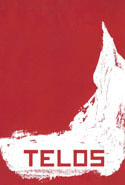 With the publication of A Treatise Of Human Nature, David Hume turned the philosophical community of his time upside down with his provocative skepticism and denial of a cohesive self. Since its initial publication, Hume’s claim that the self is nothing but a bundle of perceptions has plagued philosophers and psychologists alike, and has inspired many to completely abandon the idea of a coherent self. Yet a central question remains largely unanswered: if there is not a self, what is doing the thinking, and how is it done? If a person does not have a “self,” how come human beings think of themselves as unique and separate entities that have subjective experiences? Lowell A. Dunlap’s article “Hume, James, and Husserl on the Self” investigates how William James and Edmund Husserl tackled the notion of personal identity in the aftermath of Hume’s philosophy. With the publication of A Treatise Of Human Nature, David Hume turned the philosophical community of his time upside down with his provocative skepticism and denial of a cohesive self. Since its initial publication, Hume’s claim that the self is nothing but a bundle of perceptions has plagued philosophers and psychologists alike, and has inspired many to completely abandon the idea of a coherent self. Yet a central question remains largely unanswered: if there is not a self, what is doing the thinking, and how is it done? If a person does not have a “self,” how come human beings think of themselves as unique and separate entities that have subjective experiences? Lowell A. Dunlap’s article “Hume, James, and Husserl on the Self” investigates how William James and Edmund Husserl tackled the notion of personal identity in the aftermath of Hume’s philosophy.
Continue reading →
By Robert Wyllie · Tuesday, July 30, 2013 As an occasional feature on TELOSscope, we highlight a past Telos article whose critical insights continue to illuminate our thinking and challenge our assumptions. Today, Robert Wyllie looks at Richard Faber’s “The Rejection of Political Theology: A Critique of Hans Blumenberg,” from Telos 72 (Summer 1987).
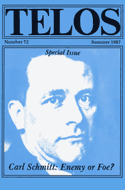 In “The Rejection of Political Theology: A Critique of Hans Blumenberg,” Richard Faber reconstructs two alternatives to Carl Schmitt’s political theology. Faber draws the first alternative from Hans Blumenberg. Blumenberg, whose later work explores how metaphor orients thought, proposes a “polytheistic” alternative to “monotheistic” political theology. Polytheism is an early modern metaphor for plural sovereignty, underlying the checks and balances of liberalism. Sympathetically, Blumenberg believes a polytheistic political theology turns away from Schmitt’s “monotheistic” picture of sovereignty where one sovereign decides the state of exception. After expositing Blumenberg’s polytheistic political theology, Faber rejects it. Instead, he turns to Walter Benjamin’s eschatological political theology. Monotheists have been promised an apocalypse, a violent divine intervention, to restore justice in the future. Unlike the Schmittian state of exception, this hoped-for intervention would ground no new legal constitution. Benjamin radicalizes the state of exception into the “pure violence” of a Marxist revolution aimed at destroying the political state altogether. In “The Rejection of Political Theology: A Critique of Hans Blumenberg,” Richard Faber reconstructs two alternatives to Carl Schmitt’s political theology. Faber draws the first alternative from Hans Blumenberg. Blumenberg, whose later work explores how metaphor orients thought, proposes a “polytheistic” alternative to “monotheistic” political theology. Polytheism is an early modern metaphor for plural sovereignty, underlying the checks and balances of liberalism. Sympathetically, Blumenberg believes a polytheistic political theology turns away from Schmitt’s “monotheistic” picture of sovereignty where one sovereign decides the state of exception. After expositing Blumenberg’s polytheistic political theology, Faber rejects it. Instead, he turns to Walter Benjamin’s eschatological political theology. Monotheists have been promised an apocalypse, a violent divine intervention, to restore justice in the future. Unlike the Schmittian state of exception, this hoped-for intervention would ground no new legal constitution. Benjamin radicalizes the state of exception into the “pure violence” of a Marxist revolution aimed at destroying the political state altogether.
Continue reading →
By Michael Millerman · Tuesday, July 16, 2013 As an occasional feature on TELOSscope, we highlight a past Telos article whose critical insights continue to illuminate our thinking and challenge our assumptions. Today, Michael Millerman looks at Luigi Marco Bassani’s “The Bankruptcy of the Republican School,” from Telos 124 (Summer 2002).
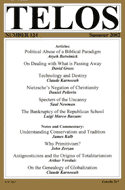 Luigi Marco Bassani’s essay “The Bankruptcy of the Republican School” (2002) consists of an overview of the conflict in American historiography between two schools of thought. The first—Lockean liberalism—insists that America was founded on principles that recognize an abstract, natural right to life, liberty, property, and the pursuit of one’s private happiness. These natural rights are liberties that define a private sphere, to be protected from government interference. By contrast, the second school proclaims that not Lockean liberalism, but rather republicanism informed the Founders’ vision of what America is and should be. Republicanism elevates such notions as “the common good” and “the public sphere” above those of “individual liberties” and “private happiness.” Indeed, it can justify infringing on the latter for the sake of the former. Hence, it is in conflict with Lockean liberalism. Luigi Marco Bassani’s essay “The Bankruptcy of the Republican School” (2002) consists of an overview of the conflict in American historiography between two schools of thought. The first—Lockean liberalism—insists that America was founded on principles that recognize an abstract, natural right to life, liberty, property, and the pursuit of one’s private happiness. These natural rights are liberties that define a private sphere, to be protected from government interference. By contrast, the second school proclaims that not Lockean liberalism, but rather republicanism informed the Founders’ vision of what America is and should be. Republicanism elevates such notions as “the common good” and “the public sphere” above those of “individual liberties” and “private happiness.” Indeed, it can justify infringing on the latter for the sake of the former. Hence, it is in conflict with Lockean liberalism.
Continue reading →
By Johanna K. Schenner · Tuesday, July 2, 2013 As an occasional feature on TELOSscope, we highlight a past Telos article whose critical insights continue to illuminate our thinking and challenge our assumptions. Today, Johanna Schenner looks at Federico Stame’s “The Crisis of the Left and New Social Identities,” from Telos 60 (Summer 1984).
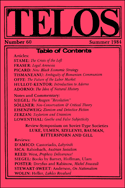 In “The Crisis of the Left and New Social Identities” (1984), Federico Stame addresses the problems encountered by left-wing ideologies and political parties, such as the banality of their demands, as well as deeper underlying issues, such as the falling away of the friend-foe nexus in politics. He also provides hope for improvement by invoking the leading role of new social identities in renewing the tradition of the political Left. In “The Crisis of the Left and New Social Identities” (1984), Federico Stame addresses the problems encountered by left-wing ideologies and political parties, such as the banality of their demands, as well as deeper underlying issues, such as the falling away of the friend-foe nexus in politics. He also provides hope for improvement by invoking the leading role of new social identities in renewing the tradition of the political Left.
Continue reading →
|
|
 Few political concepts have appeared as destined to be cast into history’s dustbin as that of empire. The nation-state is the most widely accepted model for sovereign territories, and imperial ambitions of nations are often condemned by the international community. The existence of great empires, such as that of the Romans or of the Holy Roman Empire, it appears, are simply regimes that are relics of a distant, less enlightened historical era. The areas once encompassing the great empires have now fractured into sovereign nation-states, each with its own polity and allegiances. Furthermore, serious modern confederation between nations is most often based on monetary concerns, not the furtherance of any imperial goal or ambition. The sun, it could be said, has set on the idea of empire.
Few political concepts have appeared as destined to be cast into history’s dustbin as that of empire. The nation-state is the most widely accepted model for sovereign territories, and imperial ambitions of nations are often condemned by the international community. The existence of great empires, such as that of the Romans or of the Holy Roman Empire, it appears, are simply regimes that are relics of a distant, less enlightened historical era. The areas once encompassing the great empires have now fractured into sovereign nation-states, each with its own polity and allegiances. Furthermore, serious modern confederation between nations is most often based on monetary concerns, not the furtherance of any imperial goal or ambition. The sun, it could be said, has set on the idea of empire.  In “Germany in Decline,” from Telos 127 (Spring 2004), Pierluigi Mennitti addresses Berlin’s inability to enact “true” reforms, which has subsequently led to a decline in its economic, geopolitical, and cultural influence. Through an examination of a contemporaneous Der Spiegel article, Mennitti demonstrates the reluctance of the Federal Republic to accept such thoroughgoing Reformen, which would allow it to crawl out of its then apparent decline and to depend far less on the economic strategies propounded during the so-called “economic miracle” of the post-1949 era. Although it would seem to have been premature to write off Germany as the “economic engine” in Europe, his article nevertheless offers several accurate points. For example, Mennitti asserts that Germany
In “Germany in Decline,” from Telos 127 (Spring 2004), Pierluigi Mennitti addresses Berlin’s inability to enact “true” reforms, which has subsequently led to a decline in its economic, geopolitical, and cultural influence. Through an examination of a contemporaneous Der Spiegel article, Mennitti demonstrates the reluctance of the Federal Republic to accept such thoroughgoing Reformen, which would allow it to crawl out of its then apparent decline and to depend far less on the economic strategies propounded during the so-called “economic miracle” of the post-1949 era. Although it would seem to have been premature to write off Germany as the “economic engine” in Europe, his article nevertheless offers several accurate points. For example, Mennitti asserts that Germany  With the publication of A Treatise Of Human Nature, David Hume turned the philosophical community of his time upside down with his provocative skepticism and denial of a cohesive self. Since its initial publication, Hume’s claim that the self is nothing but a bundle of perceptions has plagued philosophers and psychologists alike, and has inspired many to completely abandon the idea of a coherent self. Yet a central question remains largely unanswered: if there is not a self, what is doing the thinking, and how is it done? If a person does not have a “self,” how come human beings think of themselves as unique and separate entities that have subjective experiences? Lowell A. Dunlap’s article “Hume, James, and Husserl on the Self” investigates how William James and Edmund Husserl tackled the notion of personal identity in the aftermath of Hume’s philosophy.
With the publication of A Treatise Of Human Nature, David Hume turned the philosophical community of his time upside down with his provocative skepticism and denial of a cohesive self. Since its initial publication, Hume’s claim that the self is nothing but a bundle of perceptions has plagued philosophers and psychologists alike, and has inspired many to completely abandon the idea of a coherent self. Yet a central question remains largely unanswered: if there is not a self, what is doing the thinking, and how is it done? If a person does not have a “self,” how come human beings think of themselves as unique and separate entities that have subjective experiences? Lowell A. Dunlap’s article “Hume, James, and Husserl on the Self” investigates how William James and Edmund Husserl tackled the notion of personal identity in the aftermath of Hume’s philosophy.  In “The Rejection of Political Theology: A Critique of Hans Blumenberg,” Richard Faber reconstructs two alternatives to Carl Schmitt’s political theology. Faber draws the first alternative from Hans Blumenberg. Blumenberg, whose later work explores how metaphor orients thought, proposes a “polytheistic” alternative to “monotheistic” political theology. Polytheism is an early modern metaphor for plural sovereignty, underlying the checks and balances of liberalism. Sympathetically, Blumenberg believes a polytheistic political theology turns away from Schmitt’s “monotheistic” picture of sovereignty where one sovereign decides the state of exception. After expositing Blumenberg’s polytheistic political theology, Faber rejects it. Instead, he turns to Walter Benjamin’s eschatological political theology. Monotheists have been promised an apocalypse, a violent divine intervention, to restore justice in the future. Unlike the Schmittian state of exception, this hoped-for intervention would ground no new legal constitution. Benjamin radicalizes the state of exception into the “pure violence” of a Marxist revolution aimed at destroying the political state altogether.
In “The Rejection of Political Theology: A Critique of Hans Blumenberg,” Richard Faber reconstructs two alternatives to Carl Schmitt’s political theology. Faber draws the first alternative from Hans Blumenberg. Blumenberg, whose later work explores how metaphor orients thought, proposes a “polytheistic” alternative to “monotheistic” political theology. Polytheism is an early modern metaphor for plural sovereignty, underlying the checks and balances of liberalism. Sympathetically, Blumenberg believes a polytheistic political theology turns away from Schmitt’s “monotheistic” picture of sovereignty where one sovereign decides the state of exception. After expositing Blumenberg’s polytheistic political theology, Faber rejects it. Instead, he turns to Walter Benjamin’s eschatological political theology. Monotheists have been promised an apocalypse, a violent divine intervention, to restore justice in the future. Unlike the Schmittian state of exception, this hoped-for intervention would ground no new legal constitution. Benjamin radicalizes the state of exception into the “pure violence” of a Marxist revolution aimed at destroying the political state altogether.  Luigi Marco Bassani’s essay “The Bankruptcy of the Republican School” (2002) consists of an overview of the conflict in American historiography between two schools of thought. The first—Lockean liberalism—insists that America was founded on principles that recognize an abstract, natural right to life, liberty, property, and the pursuit of one’s private happiness. These natural rights are liberties that define a private sphere, to be protected from government interference. By contrast, the second school proclaims that not Lockean liberalism, but rather republicanism informed the Founders’ vision of what America is and should be. Republicanism elevates such notions as “the common good” and “the public sphere” above those of “individual liberties” and “private happiness.” Indeed, it can justify infringing on the latter for the sake of the former. Hence, it is in conflict with Lockean liberalism.
Luigi Marco Bassani’s essay “The Bankruptcy of the Republican School” (2002) consists of an overview of the conflict in American historiography between two schools of thought. The first—Lockean liberalism—insists that America was founded on principles that recognize an abstract, natural right to life, liberty, property, and the pursuit of one’s private happiness. These natural rights are liberties that define a private sphere, to be protected from government interference. By contrast, the second school proclaims that not Lockean liberalism, but rather republicanism informed the Founders’ vision of what America is and should be. Republicanism elevates such notions as “the common good” and “the public sphere” above those of “individual liberties” and “private happiness.” Indeed, it can justify infringing on the latter for the sake of the former. Hence, it is in conflict with Lockean liberalism.  In “The Crisis of the Left and New Social Identities” (1984), Federico Stame addresses the problems encountered by left-wing ideologies and political parties, such as the banality of their demands, as well as deeper underlying issues, such as the falling away of the friend-foe nexus in politics. He also provides hope for improvement by invoking the leading role of new social identities in renewing the tradition of the political Left.
In “The Crisis of the Left and New Social Identities” (1984), Federico Stame addresses the problems encountered by left-wing ideologies and political parties, such as the banality of their demands, as well as deeper underlying issues, such as the falling away of the friend-foe nexus in politics. He also provides hope for improvement by invoking the leading role of new social identities in renewing the tradition of the political Left. 

